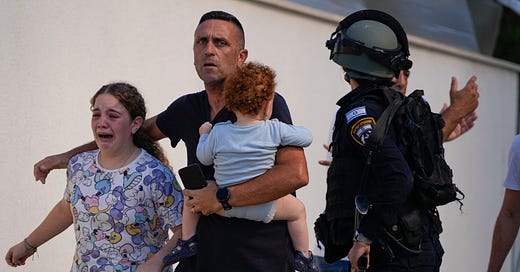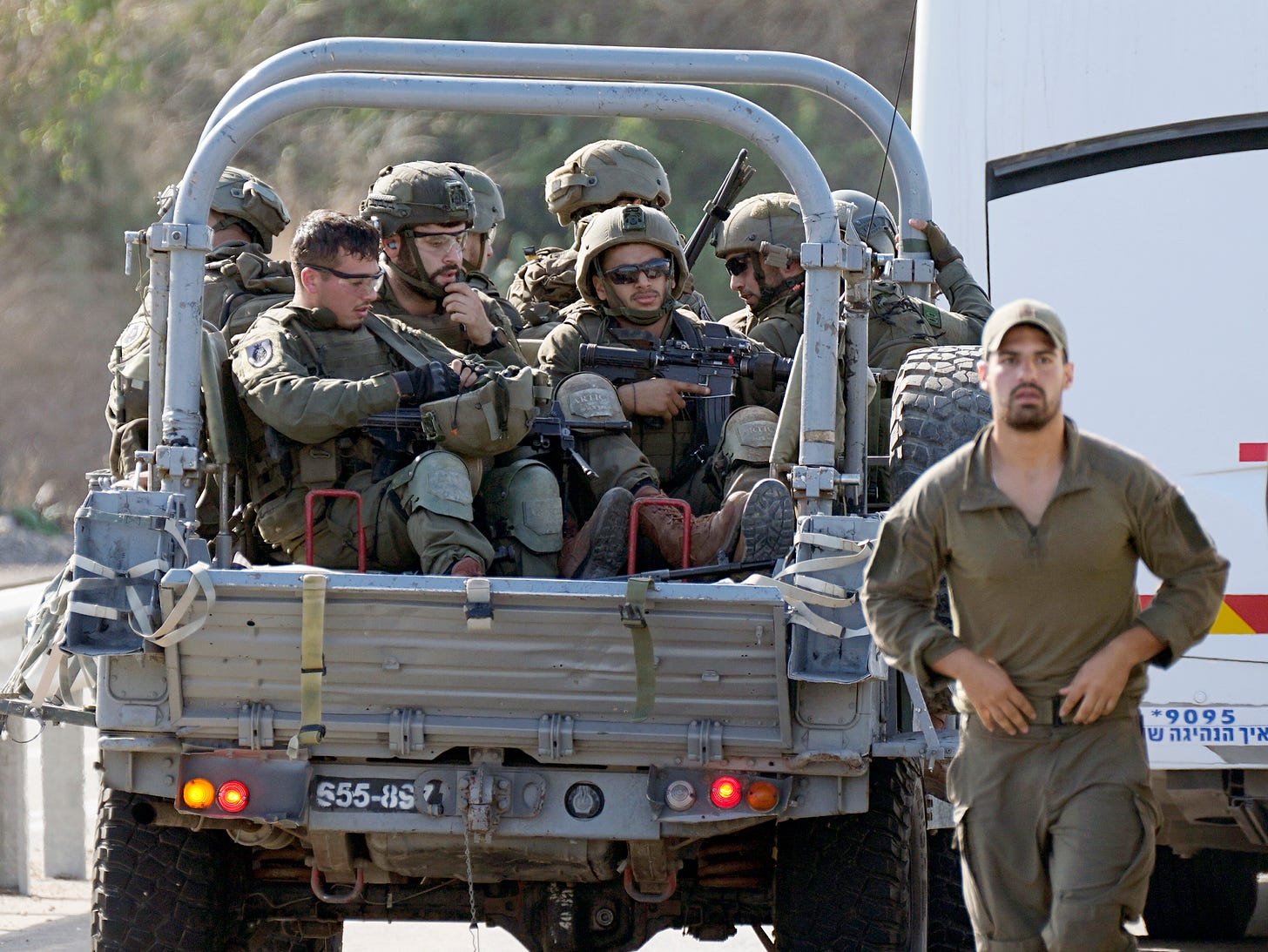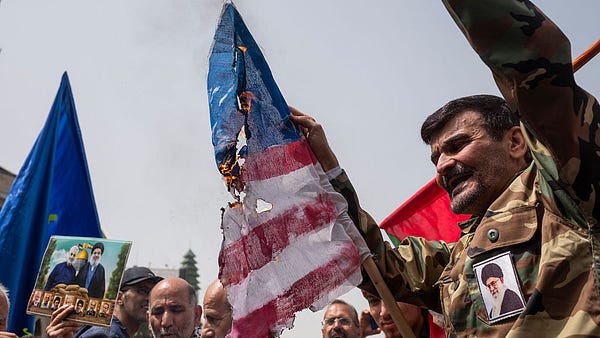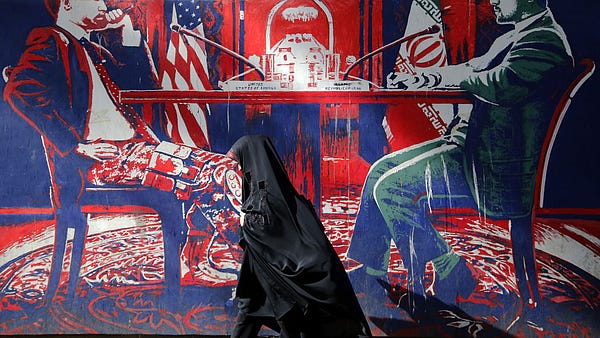
The Free Press

We gathered outside the local community center at 7:00 this morning to celebrate the last day of the High Holiday season. It’s a little known holiday called Shemini Atzeret, when we pray for rain, thank God for our bounty, and dance with Torah scrolls.
The air had a touch of Jerusalem’s fall chill, so we were, perhaps, singing with a bit more gusto than you might expect. That was when we heard the faint booms in the distance. One, and then two.
People begin to look at each other, wondering, “What is that?”
We told ourselves it was nothing. Maybe Iron Dome shot down a rocket or two—that happens here not infrequently.
But then we heard a series of explosions, still very far away. “Must be construction,” someone whispered to me.
But it was Shabbat, and there’s no construction in Israel on Shabbat. And he knew that.
Then: the air raid alarm.
People began to sprint to the bomb shelter. Fathers and mothers gathered up their toddlers and young children. Two people grabbed the Torah scrolls.
It was tight for the hundred of us crammed into the shelter—they’re all used as storerooms, even if they’re not supposed to be. But we squished in. The yawning sound of the siren continued, then stopped, then awakened again.
When it was clear that we weren’t getting out of there anytime soon, someone found a folding table. The Torah was laid on it, and the person who’d been reading continued, the sounds of the ancient Hebrew and the air raid siren blending.
Ours is a mixed neighborhood of religious and secular people, so even if you’re personally off the grid on Shabbat, you hear what’s going on. It sounded bad.
A couple of terrorists had apparently made it through the border fence and penetrated a kibbutz. That sounded horrible—terrorist penetration of security fences are every Israeli’s nightmare. But then there was another rumor that they’d taken a hostage.
That was hard to imagine. There’s an army there. It’s the border. There’s security everywhere.
When Shabbat ended at sundown and we could finally watch the news, the idea that just two terrorists crossed into Israel seemed like wishful thinking. All of our usual layers of security were nowhere to be seen.
We heard stories of people calling TV stations to tell them that they were hiding in their safe room, but terrorists just outside were shooting into the door. “Please send soldiers!” cried one woman. She was in an area that’s supposed to be heavily guarded.
Another kibbutz put out a call for the parents of a baby found by itself. It’s a kibbutz—everyone knows everyone, so the question wasn’t whose baby it is. The question was: where were the parents? The parents were nowhere to be found. Somehow, though, everyone knew where they were.
Where the army was, was much less clear.
This was a massive failure of the Israel Defense Force, especially its intelligence operations. It reminded everyone of the failures that led up to the Yom Kippur War—which started fifty years and one day ago, and, for a few weeks, seemed like it might be the end of the Jewish state.
This war may be worse—at least, from an intelligence standpoint.
But today was also a massive failure of Israel’s much-vaunted ground-fighting force. At this moment, some fourteen hours after several hundred terrorists tore through the chain-link fence that is the border with Gaza, the IDF is still battling in a dozen locations to recapture land inside Israel that the terrorists now control.
News sources reported that, for hours, 50 members of the Kibbutz Be’eri were held hostage in the dining room of the kibbutz, with the army unable to rescue them. We’re told that IDF soldiers have since arrived at the kibbutz, but the hostages are still being held captive.
Elsewhere, Hamas militants—who look like civilians, in their jeans and t-shirts, brandishing automatic rifles—dragged Israeli soldiers out of a tank. That shocked the country, and it will continue to shock everyone for a long time. It’s hard to overstate the shock. And the fury. Israelis want, in this order: to reclaim their territory, save their people, and then punish Hamas like they’ve never been punished before.
Doing all of that will require a massive force, so earlier today the government announced that it was initiating a call-up of reserves that could number in the “hundreds of thousands.”
“I am initiating an extensive mobilization of the reserves to fight back on a scale and intensity that the enemy has so far not experienced,” Israeli Prime Minister Benjamin Netanyahu said. “The enemy will pay an unprecedented price.”
It is tragic that it took a disaster of this magnitude to bring the nation of Israel together today. But Hamas has managed to do that. The staggering reports, at the moment, of 250 dead and 1,450 wounded, the images of family members looking through body bags at the entrance to the town of Netivot—that will bind Israelis together in a shared grief and rage they haven’t known in at least two generations.
They will be bound, too, by the knowledge that death may not be the worst thing that happened today. The army also posted on social media pleas to Israeli citizens not to repost videos that Hamas is uploading to Telegram, showing Israeli civilians being taken into captivity in Gaza. The army does not want families to learn that their loved ones have been captured from Hamas TV.
“We saw her on the Hamas video, so we know she’s been kidnapped, but the army isn’t telling us,” one mother told a reporter, explaining why social media was more reliable than the army. There will be rage at Hamas, but also at the army and the government. That, too, will bind Israelis together as they haven’t been in many years.
For eight years, our son was a commando in the army. When he got out and ceased being called up for reserve duty, we heaved a sigh of relief. Since then, he’s gotten married. He’s in his thirties now, and in good shape, but nothing like he was back then. And he has two kids. His youngest, his daughter, was born less than two months ago.
An hour ago, he called us to say he’d been called up. Like thousands of other Israeli parents, we’re now watching what’s unfolding with even greater horror, more worry.
No one can know how many soldiers will pay the ultimate price to keep this country alive, or how many more mothers and grandmothers and ordinary people not in uniform will be murdered. In fact, it feels like no one here knows anything that matters. We are feeling something Israelis have not felt in a long time. This is a feeling that has been obscured, perhaps, by many years of building and success and relative security. It is that feeling that has always been part of this haunting, sad, beautiful, holy place—the terror of not knowing what tomorrow will bring.
Daniel Gordis is the Shalem Distinguished Fellow at Shalem College in Jerusalem. You can read his writing on his Substack: Israel from the Inside.
And if you missed Gordis on Honestly, listen here to “Israel at 75: Miracles and Madness”:















I am praying for your family and all of the families in Israel
🇮🇱🙏🏻❤️